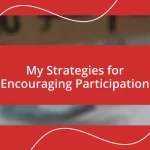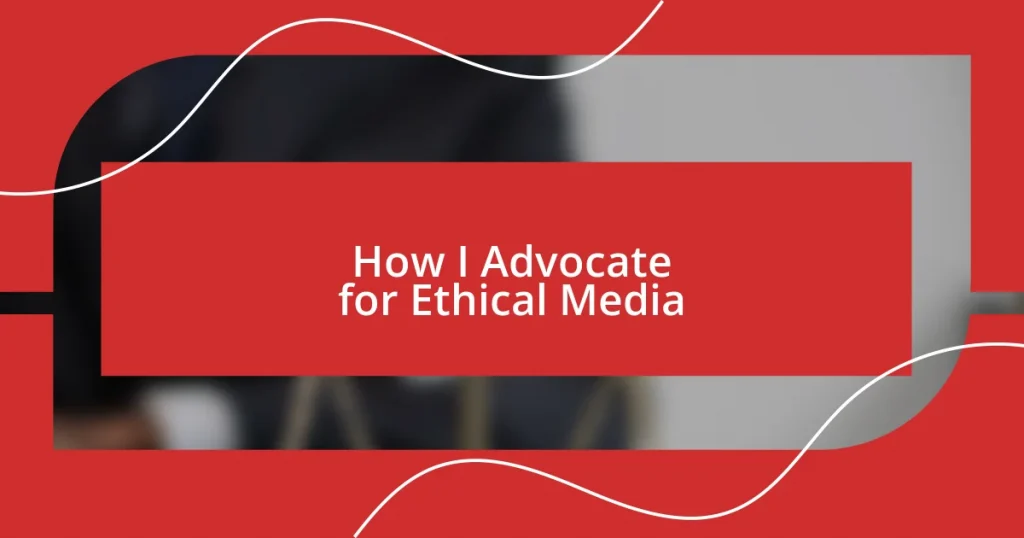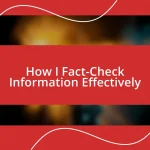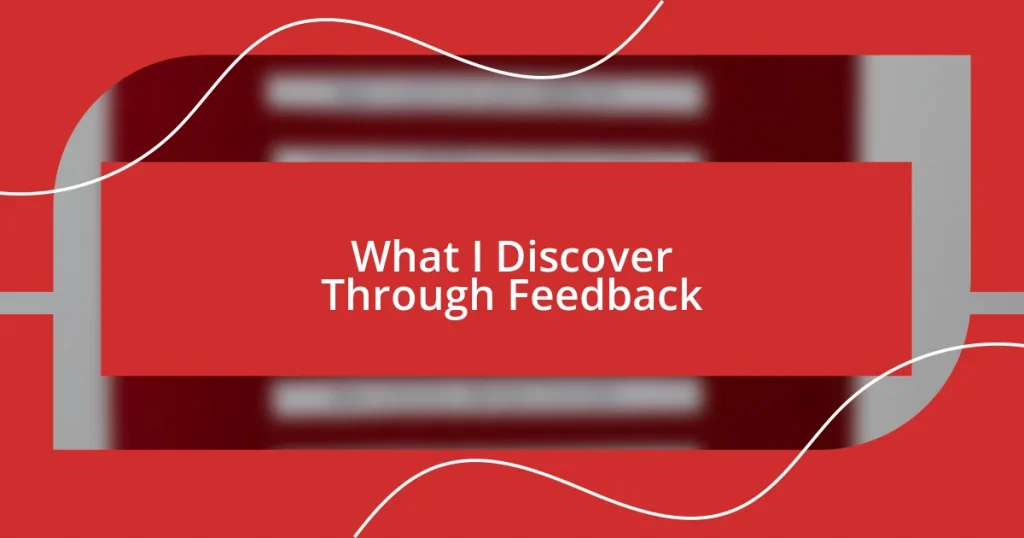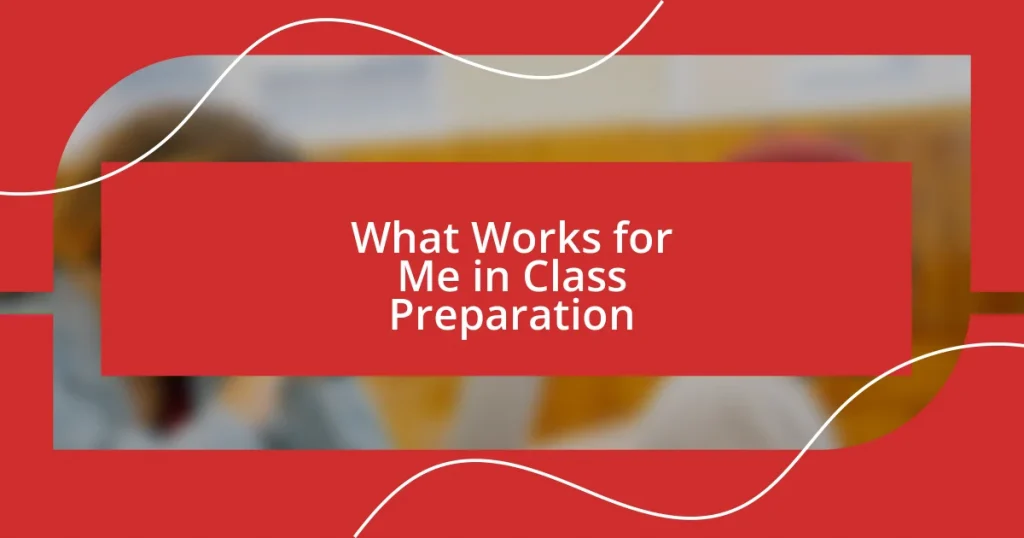Key takeaways:
- Ethical media principles emphasize truthfulness, accuracy, fairness, and the responsibility of consumers to hold media practitioners accountable.
- Engagement with media organizations through constructive dialogue and advocacy for transparency helps promote more accurate and ethical reporting.
- Education and awareness in media literacy can lead to community-driven advocacy, fostering critical discussions around media ethics and practices.
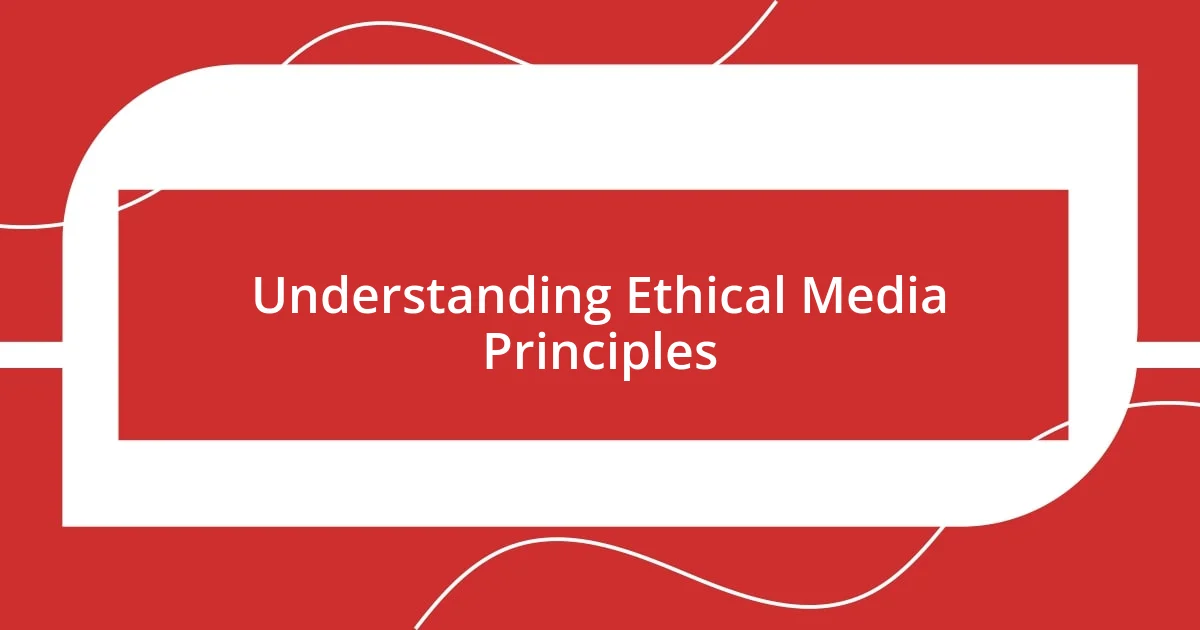
Understanding Ethical Media Principles
Ethical media principles revolve around truthfulness, accuracy, and fairness. When I think about this, I remember a time when I was involved in a community project aimed at combating misinformation. It was eye-opening to see how a single misleading piece of information could spiral out of control and affect real lives. This experience reinforced my belief that ethical media isn’t just a guideline; it’s a responsibility we all share.
Consider the importance of accountability in media. Have you ever questioned the motives behind certain headlines? I certainly have. There was a time when I stumbled upon a sensational news story that exaggerated facts for clicks. It left me feeling uneasy. This made me realize that as consumers, we must hold media practitioners responsible for their content. Their choices impact not only public perception but also our collective understanding of important issues.
Lastly, inclusivity and diversity are pivotal to ethical media practices. When I attended a panel discussion on representation in journalism, I felt a surge of hope seeing diverse voices advocating for change. It raised a thought: how can we resonate with communities if their stories are not told authentically? Ethical media must reflect the vibrant tapestry of society, ensuring everyone has a seat at the table.
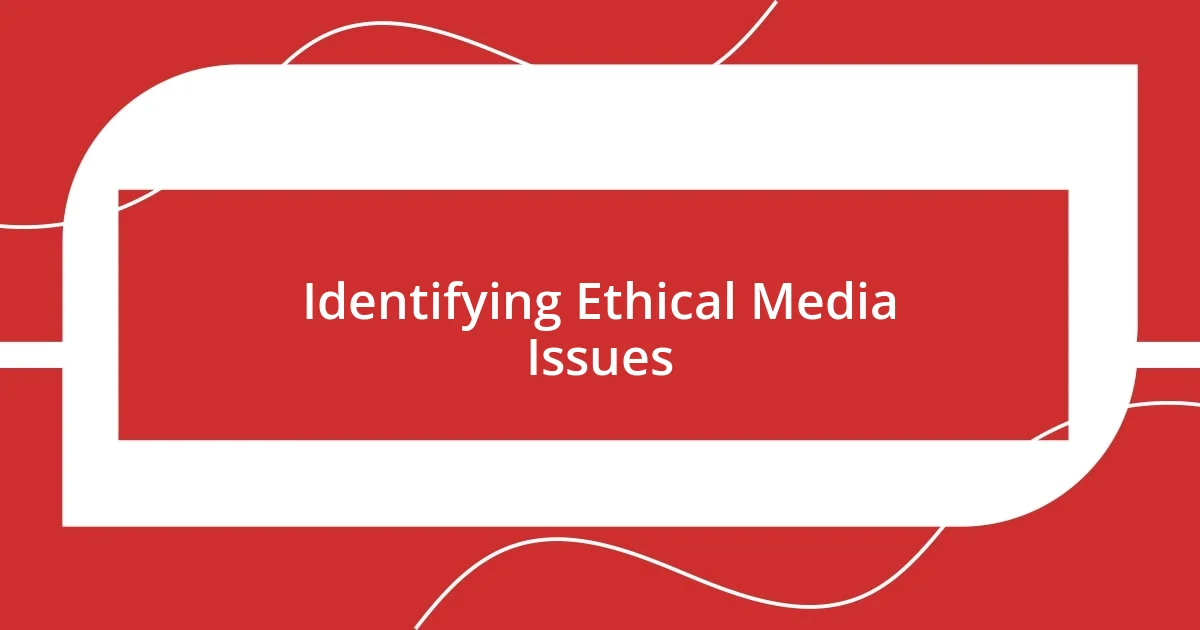
Identifying Ethical Media Issues
When it comes to identifying ethical media issues, one key element is recognizing biases in reporting. I vividly recall a time when I was watching a news segment that seemed to cherry-pick facts to support a specific narrative. It struck me how easily viewers could be swayed by selective storytelling. This experience highlighted the need for vigilance when consuming media; understanding the underlying biases can help us critically analyze the information presented to us.
Another essential factor to consider is the source of information. There’s an old saying, “Don’t judge a book by its cover,” but in media, the source often dictates perceived credibility. I remember coming across an article from a little-known website that claimed to have breaking news but lacked any substantial evidence or context. It was astonishing to see how quickly such articles could circulate on social media. This taught me the importance of verifying sources and seeking out reputable journalism to avoid falling prey to misinformation.
Finally, recognizing the impact of sensationalism is crucial. I recently came across a documentary that delved into the psychological effects of sensational news on viewers. It made me realize how often we see headlines designed to incite fear or outrage rather than inform. This reflection reinforced my commitment to advocate for media that prioritizes substance over shock value—only then can we foster truly informed public discourse.
| Key Ethical Issues | Description |
|---|---|
| Bias in Reporting | Selective storytelling can distort the truth, influencing public perception. |
| Source Credibility | Reliable sources provide context and ensure information accuracy, preventing misinformation. |
| Sensationalism | Headlines designed to provoke emotional reactions often compromise factual reporting. |
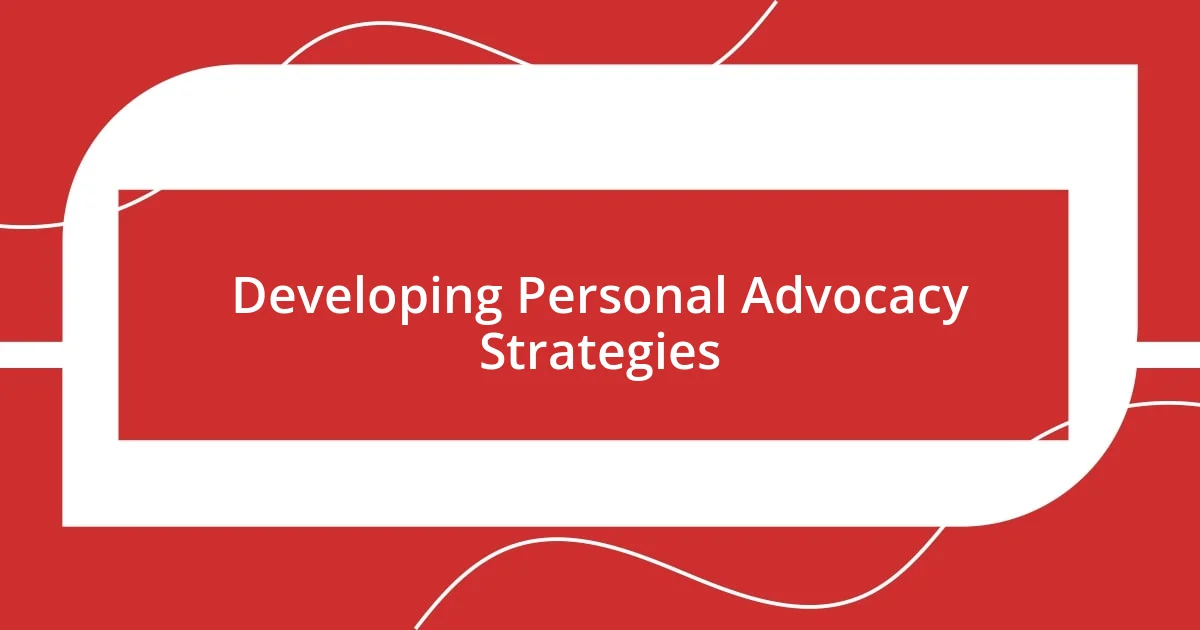
Developing Personal Advocacy Strategies
When it comes to developing personal advocacy strategies, I find it crucial to identify my core values in media literacy. For me, engaging in discussions with friends and colleagues about media consumption not only sharpens my perspective but also creates a community of informed advocates. I remember the first time I invited friends over for a movie night and intentionally picked documentaries that highlighted media ethics. The conversations sparked by those films opened my eyes to different viewpoints and reinforced the importance of being proactive rather than reactive when it comes to media consumption.
Here are some personal strategies I use to advocate for ethical media:
- Engage in Media Literacy Workshops: Participating in or helping to organize workshops can empower others with critical thinking skills.
- Share Resources: I often share articles, podcasts, or books about ethical media on my social networks to broaden awareness among my peers.
- Start Conversations: Initiating discussions on current media events in daily conversations helps keep the topic alive and encourages others to think critically about media messages.
- Support Ethical Journalism: I consciously choose to subscribe to and share credible news outlets that prioritize ethical practices.
- Encourage Diverse Voices: I make it a point to uplift and share stories from underrepresented communities; this not only enriches my understanding but fosters a more inclusive media landscape.
Advocacy also thrives on staying informed about current issues. Once, I attended a town hall meeting where local journalists discussed the challenges they faced in reporting accurately amidst a flood of misinformation. Listening to their struggles and triumphs provided me with insight into how I can support ethical journalism in my community. I learned that advocacy means not just speaking up but also amplifying the voices of those dedicated to integrity and accuracy.
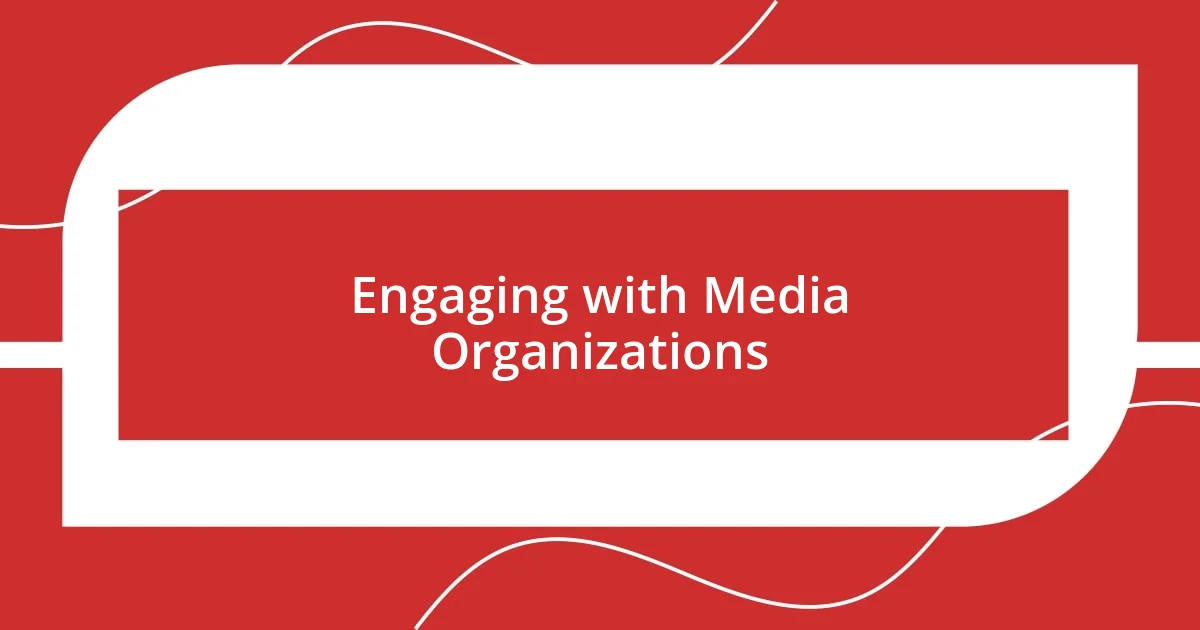
Engaging with Media Organizations
To effectively engage with media organizations, I personally believe in fostering relationships that are built on mutual respect and shared goals. For instance, I once reached out to a local news outlet to discuss their coverage of community events. It was heartening to see how open they were to feedback. This experience reinforced my view that constructive dialogue can lead to more accurate and ethical reporting, ultimately benefiting both the media and the community.
I’ve also found that attending media forums or workshops can be incredibly beneficial. I remember attending a session where journalists and advocates came together to discuss media ethics. The energy in the room was palpable! Everyone shared insights and experiences, and I left feeling energized and better equipped to advocate for ethical standards in journalism. Engaging in such environments allows me to voice my concerns while also learning from the experiences of others, creating a richer perspective on the complex challenges media organizations face.
One of the most impactful ways I’ve engaged with media organizations is by lobbying for transparency in their reporting processes. I often ask journalists how they verify facts, and during a recent event, I posed this question to a panel of reporters. Their genuine explanations about sourcing and fact-checking were enlightening. It made me realize that when we engage directly, we’re not just advocating for ethical practices; we’re inviting a culture of accountability that benefits us all as media consumers. Isn’t it fulfilling to know that our conversations can push the boundaries of ethical journalism?
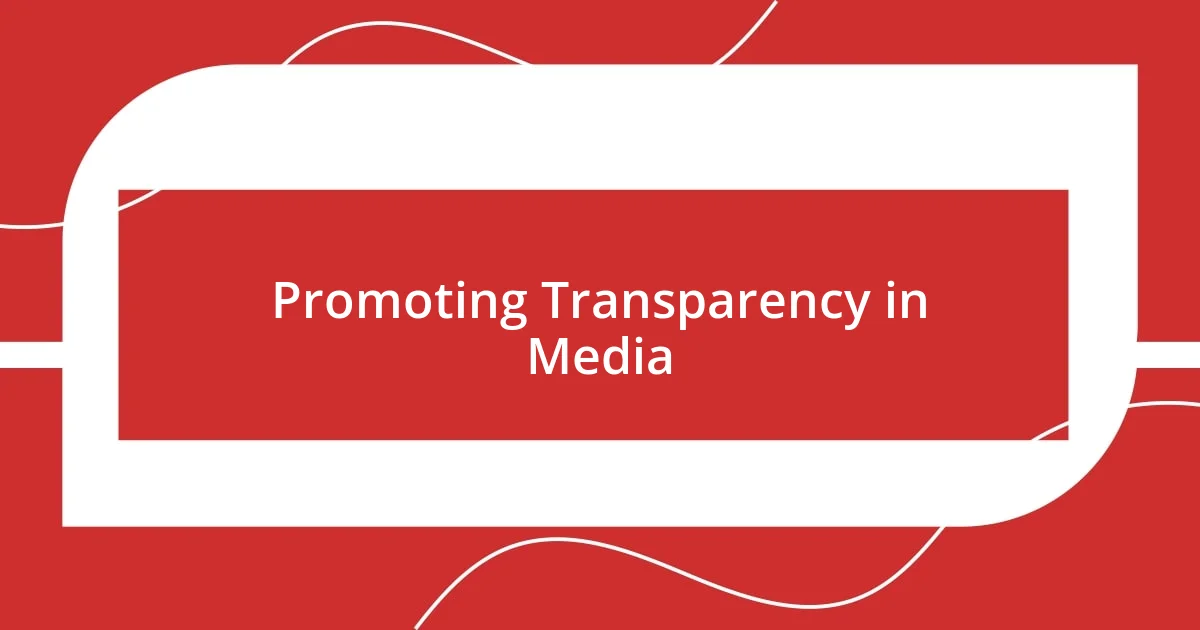
Promoting Transparency in Media
Promoting transparency in media is something I’m deeply passionate about. I’ve experienced the power of transparency firsthand during a local film festival, where a documentary director shared behind-the-scenes stories about their ethical decision-making. Hearing their thought process was eye-opening, as it showcased how transparency can enhance trust and credibility. It’s moments like these that make you realize how critical honest dialogue is between media creators and consumers. Wouldn’t you agree that knowing the “why” behind a story often shapes our understanding and acceptance of it?
In my opinion, transparency is more than just a buzzword; it’s a vital practice. I recall a time when I reached out to a news platform after noticing inconsistencies in their reporting on a major local event. Rather than being met with defensiveness, the outreach led to a candid conversation about their editorial choices. I was pleasantly surprised by their willingness to reflect on their process, which not only restored my faith in their integrity but also inspired them to share more about their reporting methods with their audience. This exchange made me wonder: how many other outlets would embrace such honesty if we simply approached them with curiosity instead of criticism?
I strongly believe that advocating for transparency should also involve amplifying media literacy. I often host small gatherings where we dissect recent news stories together, examining how different outlets frame the same event. It’s interesting to see how various perspectives emerge, illuminating the importance of transparency in their reporting. I’ve seen participants leave these discussions feeling empowered, equipped with the skills to critique media messages more effectively. Isn’t it rewarding to foster a community that values transparency, enriching our collective understanding of the media landscape?
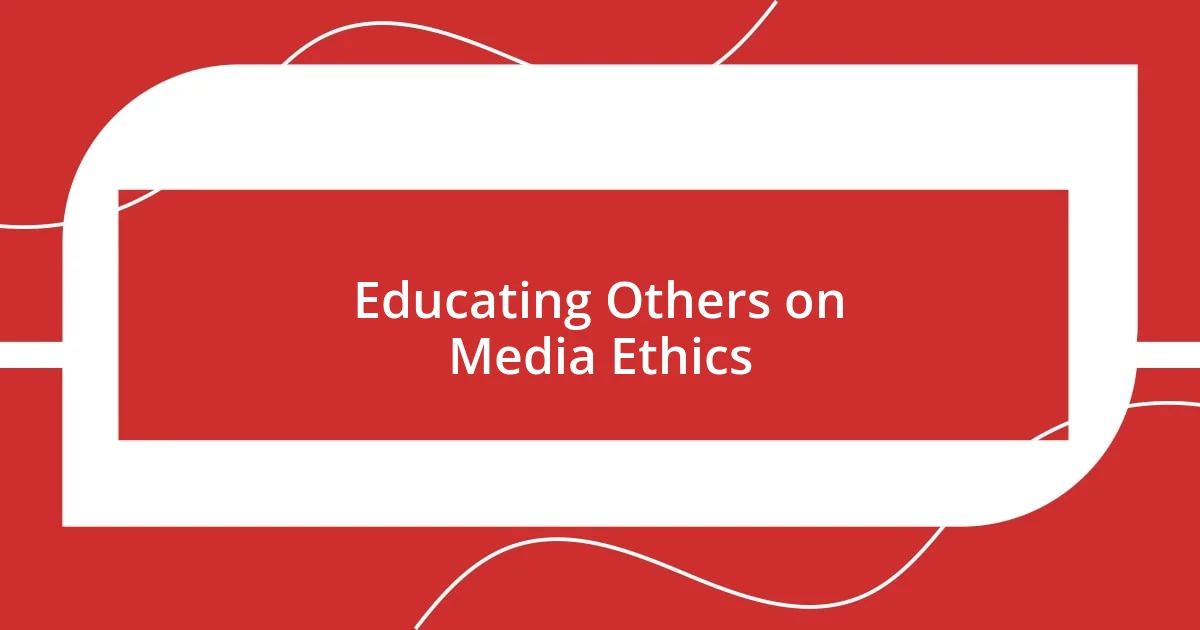
Educating Others on Media Ethics
Educating others about media ethics can be a transformative experience for everyone involved. I remember when I organized a small workshop at my local community center focused on understanding media bias. The conversations flowed naturally as participants shared their own experiences with misleading headlines. By dissecting these examples together, I felt a sense of camaraderie building among us—a shared commitment to fostering critical thinking about the media we consume.
On another occasion, I facilitated a discussion among my friends over coffee, where we explored the importance of verifying sources. I asked, “How often do we click on links without checking who is behind the content?” This sparked a lively debate. People started to share their stories of misinformation and how it affected their understanding of current events. It struck me then that making this a communal effort allows us to reflect together on our responsibilities as media consumers—and potential creators.
I find it incredibly rewarding when I see individuals become advocates for media ethics themselves. One time, a participant from my workshop reached out to me excitedly about starting a blog that addresses ethical journalism practices. Their passion reignited my own motivation and reminded me that education doesn’t just end with one session. It grows and flourishes as people carry the message forward. Isn’t it fulfilling to realize that we can ignite a ripple effect of awareness and responsibility, one conversation at a time?
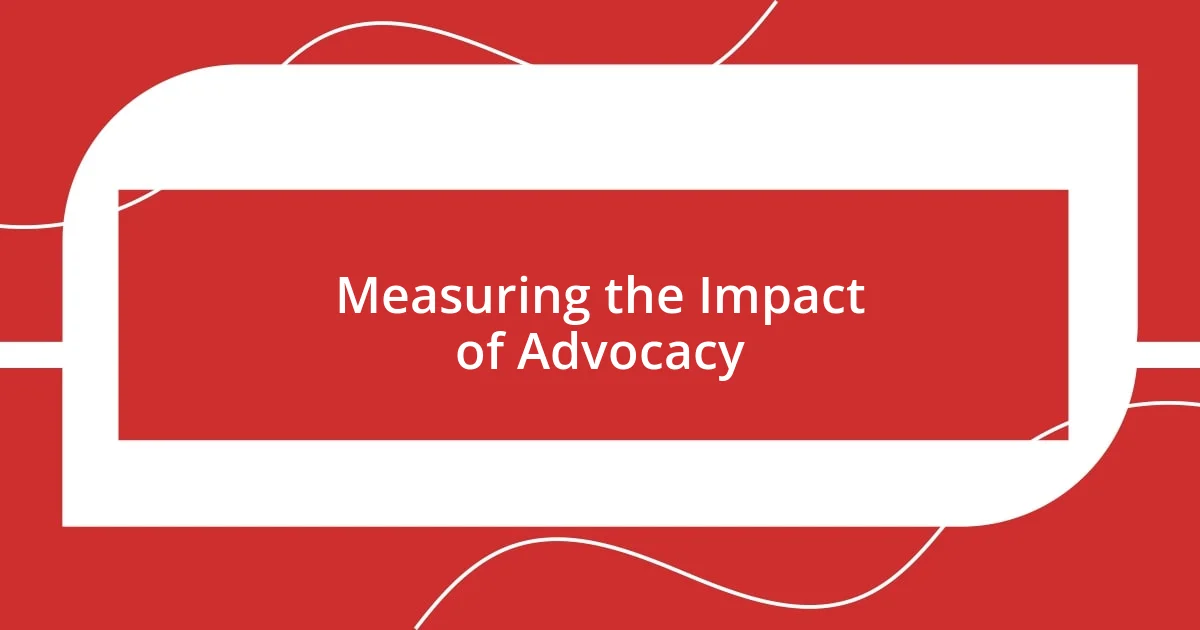
Measuring the Impact of Advocacy
Measuring the impact of advocacy can often feel like an elusive task, yet I’ve discovered some practical methods through my experiences. For instance, tracking the engagement levels from workshops I conduct gives me invaluable feedback. When I notice an uptick in attendees actively sparking conversations outside of the workshop, it tells me that the message resonated. Isn’t that the ultimate goal?
I remember a project where I teamed up with a local journalism student to create a survey about community perceptions of media integrity. Analyzing the responses came with genuine surprises, especially when many participants expressed a desire for more ethical reporting. This insight made me realize that advocacy is not only about spreading awareness but also about understanding the pulse of the community. How can we argue for change if we don’t first listen?
Another approach I’ve utilized is evaluating the reach and visibility of social media campaigns. Recently, I ran a short campaign highlighting ethical journalism practices, and the number of shares and comments exceeded my expectations. Each interaction felt like a small victory, reinforcing my belief that even the smallest advocacy efforts can lead to broader conversations. I ask myself: if one post can inspire critical thought, imagine the impact of fostering continuity in discussing ethics within our communities.




